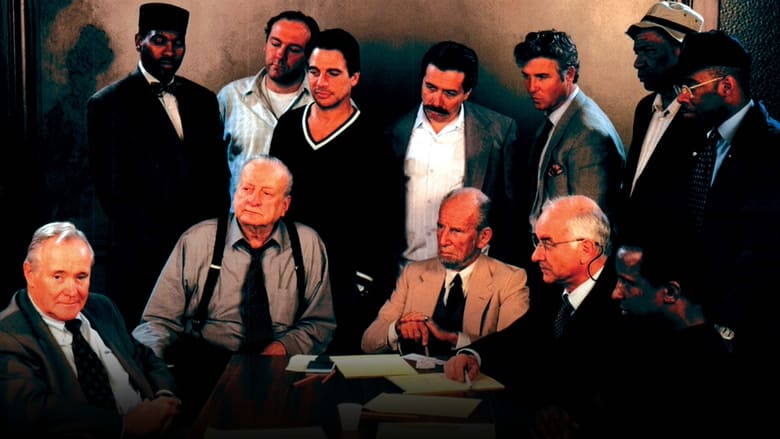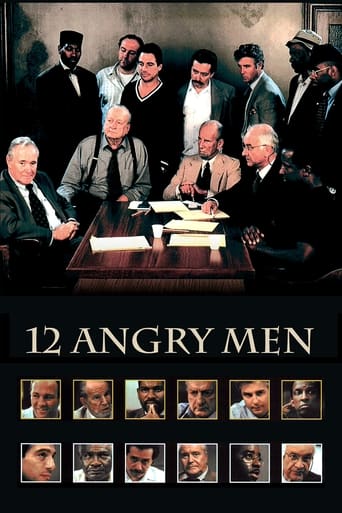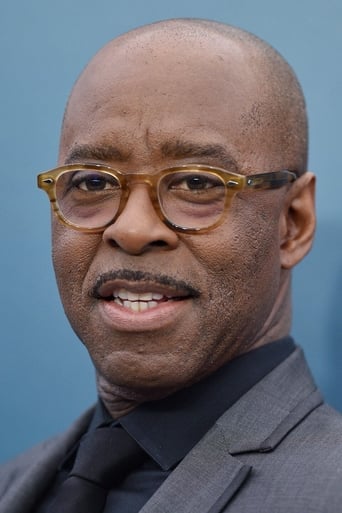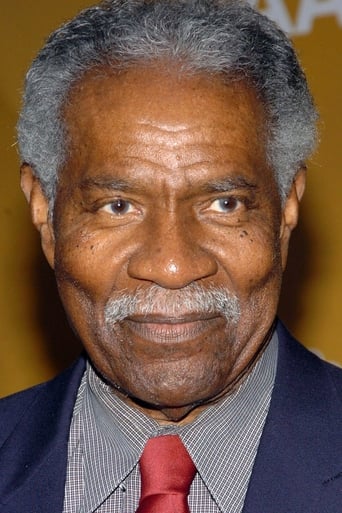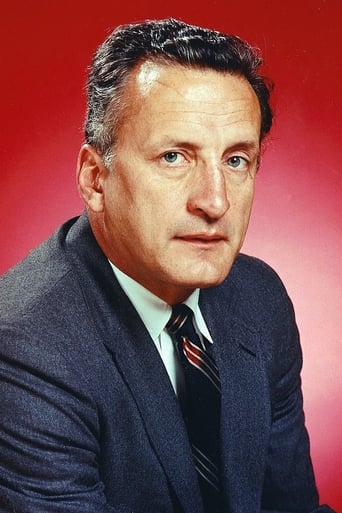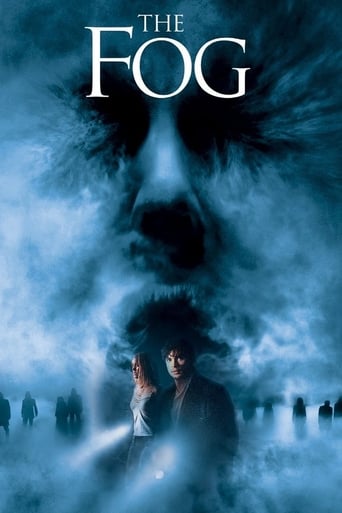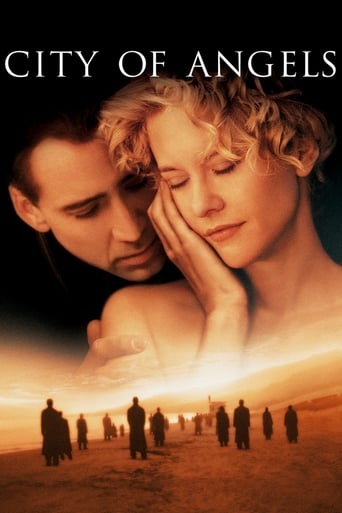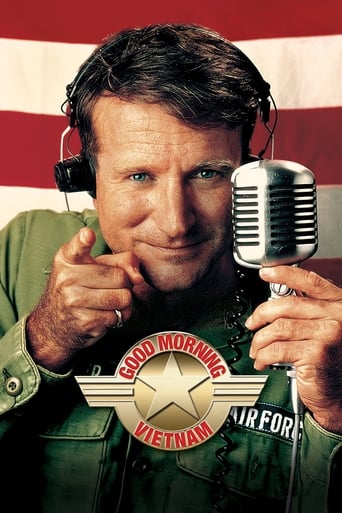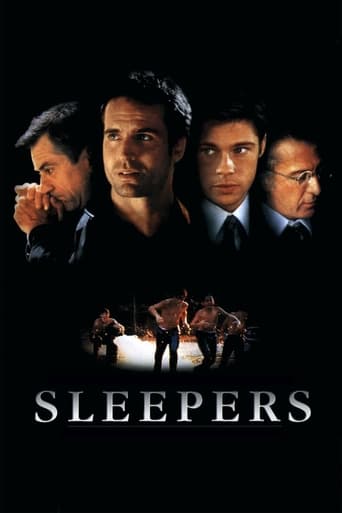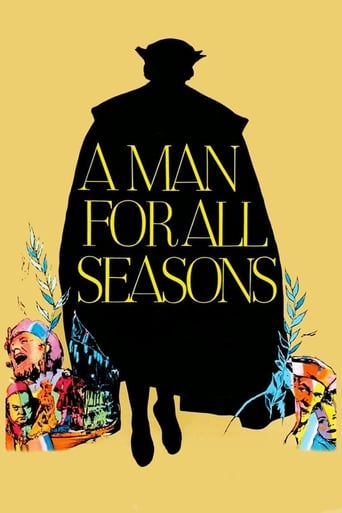12 Angry Men (1997)
During the trial of a man accused of his father's murder, a lone juror takes a stand against the guilty verdict handed down by the others as a result of their preconceptions and prejudices.
Watch Trailer
Free Trial Channels
Cast


Similar titles
Reviews
Intense, gripping, stylish and poignant
A lot of fun.
It's a mild crowd pleaser for people who are exhausted by blockbusters.
Easily the biggest piece of Right wing non sense propaganda I ever saw.
January 3, 2017 - There are movies that remind you why you love movies.The deliberations of a jury in the case of a homicide: a young man with a difficult course is accused of the murder of his violent father. From the beginning, the case seems clear: the son is guilty because everything accuses him. A first round of voting is requested. All vote "guilty" except one man. Thus begins a discussion of one hour and fifty which will reveal the reasons for the act, the unresolved issues of the investigation, the various motives of the members of the jury. Everything happens, everything explodes because of a single individual who did not say "guilty". A man who wanted to know more, because he was not convinced in his soul and conscience of the guilt of the young man. As simple as it is, 12 Angry Men is an exceptional story, which tells so much about the human, his social relationships, his relationship to the truth, what he believes to be the truth, the interference of personal experiences in his perceptions and on the strength of doubt and dialogue. The 1997 version by William Friedkin (The Exorcist, French Connection, Sorcerer, To Live and Die in LA, ...) is splendid. 2 hours of dialogue in a closed room that keeps you in suspense, you have to do it. The plot focuses on the arguments and gives no conclusion as to the guilt or otherwise of the accused. It's very strong because the point of view of the film is precisely what is said about the act, and not its nature.January 12, 2017 - I just saw the 1957 version of Sydney Lumet with the splendid Henry Fonda.Surprised: I find that the version of William Friedkin of 1997 is better than that of 1957. Longer than 20 minutes, better staged, better characters, the tension is more palpable. But seeing the one from 1957, I remember that I clearly felt the progress of the tension thanks to the very subtle work of Friedkin's camera. If you look at it (look at it!), Observe when it is tight or wide, when it moves the camera or not and how the Fa4on to show the scene influences the emotional intensity. I just saw it for the fourth time in 6 months and I do not get tired.It reminds me that this great director and not known assz has made a better remake of another classic, the Salary of Fear. His version is called in French The Convoy of Fear (or Sorcerer in VO) and it is extraordinary. Re-released on DVD / Blu-Ray recently thanks to its status of cult film.Decidedly this guy is an unknown genius. He has to his credit a flop of intriguing and sometimes disturbing films.Praise of doubt: faced with 11 certainties, 1 man gives a doubt and that will save the accused. Jack Lemmon, the ordinary and modest man who said no.This story seems to me very important in our time when the media is on the alert because of the explosion of information sharing methods. We must more than ever be cautious when appearances, labels, reputations. We must never believe, we must examine, always. Alain -
It's amusing how everyone here reviewing this movie says that the original is better, and probably because they think they are just supposed to think that way. This new version is FAR better than the old version. In the old version they are doing that old 50's stage-acting way of talking real fast, which of course today does not sound authentic at all!! The new version's actors are so much better at acting and therefore much more believable. All of these actors in the new version were tremendous in their roles, making this version light-years better than original version.
Sidney Lumet's 12 Angry Men is not only a great courtroom film but a great film in itself, so anything that follows must be hard pressed to keep up. The story, originally from Reginald Rose, is largely unchanged. Twelve men have a boy's life put into their hands, and eleven of them are angry enough to be rid of him immediately. The casting enables something that was less prominent in the 50s, a multi-racial cast. In addition to the judge now being female, there are now four African-American jurors in addition to the original non-American watchmaker (and another with an obvious German accent, which is curiously never addressed). If the casting of the black jurors could add a new angle to the story, Friedkin does not run with it. What he instead does is play race against race, minority against minority. They might have the same skin colour, and might initially address each other as 'brother', but their views could not be more different. Juror 10 is in fact a racist of another level, with hints of severed ties with the Nation of Islam. So not only is he a racist, but he is a racist that even other racists cannot stand. But there is a sorely missed opportunity here. Perhaps the most emphatic scene of Lumet's was the gradual and dramatic turning of the backs of the jurors towards the racist tirade, and Ed Begley spluttering and slowly having his loud, pushy persona deflating before our very eyes. When he does vote guilty, he is utterly defeated. Here, Mykelti Williamson is not confronted with the same level of contempt, and his beliefs are not even challenged. When he finally changes his vote, it is not a moral victory, but him merely conceding his own vengeance against the Hispanic race. The other prominent 'antagonist' of the story is juror 3, whose inhibitions are sourced from his resentment towards his own son. Lee J. Cobb was an ugly-faced bully throughout, so grotesque and intimidating that it made it all the more effective when he caves in. George C. Scott can't quite match this constant intensity, although he would have been the clear winner in his prime, making full use of his famous temper. But he does improve the climax of the character, only because his version is a much older man and he has the ability to make his face crumble and crease inwards as he sobs over his estranged son. He takes the accused's words truly to his heart. It is a much more pitiful affair when his age brings in the issue of grandparents and connections missed. And then there is the all-important juror 8, the moral compass of the group, the one who isn't so easily swayed. Lemmon isn't as firm as Fonda, that is to be sure. He can't sell the glint in his eye as well, and when he pulls out the second identical knife and rams it into the table, it is a rather feeble move. Because Lemmon looks to be one of the oldest of them all, the dynamics are shifted. It is not his inherent good-nature that affords him the ability to not flinch at the stabbing of the knife, but perhaps a mutual understanding with juror 3 and a lifetime of wisdom and experience at reading others. Lemmon was always at the top of his game when he brimmed with his trademark nervous energy. That is not to say that he is no effective with that vitality gone - you only have to witness the pathetic man in Glengarry Glen Ross to be proved wrong there. But this role is ultimately the wrong fit for Lemmon. It asks for resoluteness, something that he would respond to by turning away and a creased smile. In the original, Boris Kaufman had a way of compressing the space within the cramped, stuffy juror's room in addition to the flaring tempers and disagreements. He slowly cranked up the focal length, squeezing the depth of field and the actors together in the telephoto (except, of course, for that errant shot of Joseph Sweeney in urgent close-up). He used heat to create claustrophobia as if they were sitting in a pressure cooker, and raised the temperature gradually, making the men's foreheads shimmer, until finally allowing the rain to wash it all away. Visually, Friedkin's version might have made the most departure. The heat is treated as an afterthought; though we see pools of sweat on their bodies, they don't glisten with the same intensity, so the rain doesn't have a defined role. The camera hovers constantly behind shoulders, and cannot stop swiveling and moving in and around the table, which goes against the very idea of claustrophobia. The characters often stand and leave their seats, but not for any known reason. The lack of dramatic staging is the most disappointing aspect here. But it is hard to measure up to perfection.
The movie had one simple story. The story was to be told by 12 men. As they examine the character and the plot of the movie, their characters are examined and developed. Jack Lemmon's performance in this movie was amazing. Even better was G.C Scott's performance. The frailties and the strengths of each character made their stories very believable. I thought some actors could have done better, but in a weird way, their character in the movie supported the weak performance. I know, it sounds weird but that is my observation. Space-wise, the movie had very little to work with. It had an abundance of characters in that very little space and the script was so well written for all characters to have some relevance or the clear lack of it in that room. I will recommend this drama any day. For added effect (totally unnecessary), play this movie again with the monitor off and pretend you are eavesdropping on the jury. If that does not do it for you, nothing will.

